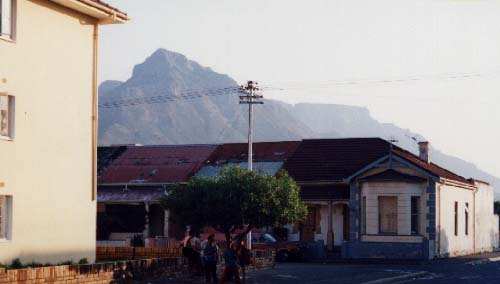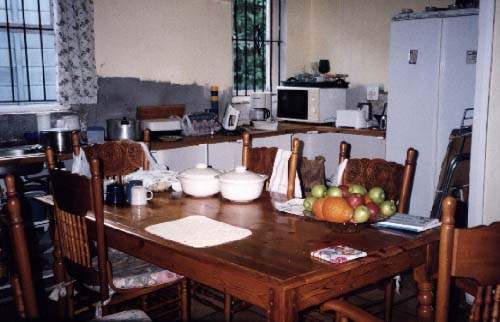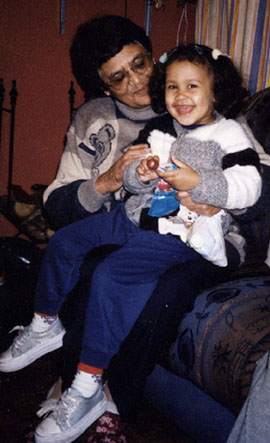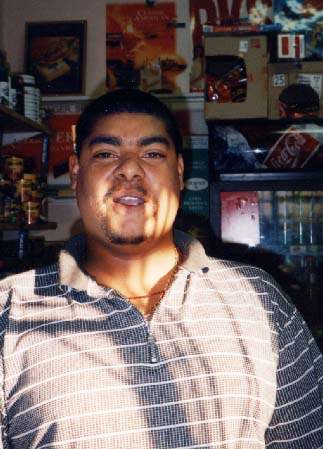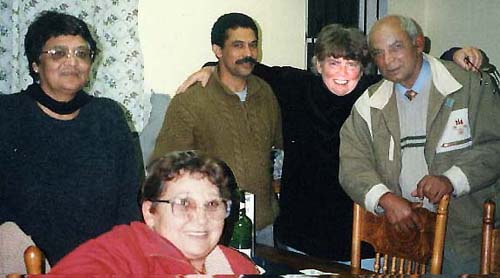The Colorful Community of Maitland

Monday, August 14 |
| While I was working at the school I stayed with Nicky Paulse, the most talented teacher I saw during my stay. OBE comes naturally to her, and is necessary in her subjects -- accounting and entrepreneurship. I joined her for the entrepreneurship class on two occasions, first for a night school class (for adults with day jobs) and then for the matric class in the finishing school. For the night school class I proposed that they think of me as the market -- an American who has arrived in SA with money to spend. Working in groups they each came up with a plan and then presented it to the class while others did some trouble-shooting on the problems with each proposal. At the next class Nicky asked them how they liked our session and they said they did, but what really pleased me was their saying that they talked about it on the way home, and realized how much they had learned about business plans from her course. It made us both feel good. |
| Nicky and her husband Desmond live in Maitland, a formerly colored community right next to Pinelands, where Frances and Michael Roux live. Maitland is now an integrated community including both white and black families as well as colored. Desmond is a skilled carpenter (particularly skilled with tiles) and they are in their third house -- fixing it up with the idea of selling it at a later date. Lindiwe had asked Nicky to host me, knowing that they had a large house and no children. There are hour bedrooms in the house, and they are building a two-bedroom apartment in the back for Nicky's mother, Jean. |
| My first night there we all had dinner, then went to visit Nicky's sister and then on to their friends Peter and Sue. Sue and Jean have been friends for years, and the six of us all had a great time on a succession of evenings. Sue is white enough that she could have passed, but "didn't bother" and Peter appears to have found every way to enrich their lives despite apartheid. He has traveled to 44 countries (mostly in Asia where the rand goes the farthest) and all traveled all over SA, even under apartheid. They regaled us with stories about challenging the laws by making phone reservations at restaurants and then showing up to embarrass the maitre d', who had to say they had no room. The Holiday Inn would seat them, but when they tried to dance one evening, the band suddenly announced that there were "technical difficulties." "And you know what," says Peter, laughing even now, "We were the technical difficulty!" Desmond, Sue and I had great conversations, too. Desmond struggles with the same problems with his workers that you find on the Delheim farm. One day one of his workers stole his coat, another day a set of screw drivers, but the new South African labor laws make it difficult to fire anyone, so he threatens to dock each worker 50 rand until he gets his coat back, but in the end he doesn't do it, because he knows families are depending on that money. |
| On one day that week, instead of teaching classes, Lindiwe, the director of the school who had invited me in the first place, had arranged to take me to see some other schools. We went to a primary school and a regular high school in Langa, then to a mixed school (colored and black) in Heidevelt, which is next to Guguletu. Lindiwe's childhood friend Sindiwe, who lives in New York, was also visiting this week, and the three of us made these visits, giving both Sindiwe and me the chance to speak to classes. Sindiwe speaks with passion about students' need to stay in school and avoid teen age pregnancies -- the surest guarantee of the slow track to success. She was in SA to participate in woman's day and talk about her books, including her latest, *Mother to Mother* about the story of an American named Amy Biehl who was killed in 1993, just before the elections. |
| After the school visits we hurried to her family home in Guguletu because we got word (aren't cell phones a miracle) that the Capetown newspaper was there for an interview. While she talked to them Lindiwe and I walked around the quiet streets of Guguletu where they both grew up. This was a black township where people were resettled when they were kicked out of white areas. Every house was built the same -- four rooms, with no indoor plumbing. When apartheid ended, everyone who had been a longtime resident was given their house, and now they have grown with added porches, garages, bathrooms etc. Families who can are selling and are moving out of Guguletu into places like Maitland, and others are moving in from the corrugated tin shacks that have so often been photographed. This is good for the families, but unsettles the community where leadership needs to change hands. We watched a brand new community center being built, but there aren't many businesses here. The finale to our day was a trip past these shacks to a place called the Crossroads, where we had a Xhosa meal in a historically restore building which lies fenced in on the most unlikely plot of bright green grass, right in the middle of all these shacks. Here a group of women are trying to make a tourist business of serving lunch to those willing to brave the townships. Lindiwe, Sindiwe and I had a great time, and I got some genuine homemade ginger beer. |
| What did I notice about the schools? Well the buildings were orderly (and of course there was tight security, with fences a little more ominous, but ultimately no different in purpose from those at Poly Prep. We noticed some classes where the teacher was not in the room and no explanation was given. I photographed a door to a faculty room that says "no learners permitted." I know it is just a figure of speech, but rue the day when teachers are not learners. |
| Alas, that would be my final conclusion. The challenge is not how to turn students into active learners, but how to turn teachers, who themselves were raised to be passive memorizers, into confident coaches and mentors to active student learning. |
| My last day at the finishing school I visited the criminal law classes which were a lot of fun. Even though there was some rote recitation of a page of facts about the relationship of alcoholism to crime, it was followed by discussion -- they students may not have seen snow, but they have certainly seen crime! I did a mini version of a trial I do in my own class about a girl who dies after a party and the class concluded it was the mother's fault. I am glad I bought a book on African family law so I can read up on how they came to that conclusion. |
|

